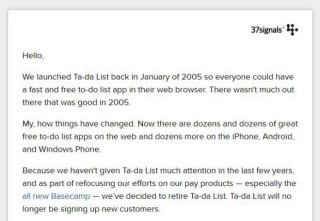The curse of free cloud services: a cautionary tale

I am a big fan of cloud services. I've been migrating more and more of my local services to the cloud.
There are a couple of reasons for this. First, I like being able to delegate responsibility for the operation of an application to a cloud vendor. When I moved my company off of local QuickBooks to QuickBooks Online, for example, I no longer had to maintain the QuickBooks software, the multi-user server minutiae -- or provide internal tech support.
See also: Quickbooks or Sithbooks? Bookkeeping on the dark side
I also like moving to the cloud because I tend to access my information from a lot of different locations and computers. I work in my main office, my den, my living room, on my tablet, on my laptop, in the studio, in the garage, and so forth. Keeping all my data synchronized on all those machines gets old after a while.
But cloud services have their failings, as well. And I'm not talking about the usual crashes and cyberattacks.
See also: Is the cloud still safe? How to survive a cloud computing disaster.
See also: Cloud storage and backup: Is it safe?
No, sometimes the service just goes away. Google users are familiar with the phenomenon. Loyal users of Google Health were disappointed last November when the service was shut down.
See also: You have a month to wrap up your health records at Google Health
Del.icio.us users almost lost their minds when it appeared the service was being shuttered by Yahoo, only to have it bought up at the last minute. And when it looked like Xmarks was going to the great cloud in the sky, I even took the Xmarks pledge.
See also: I took the Xmarks pledge and why you should, too.
Now, it's Ta-da List, operated by the well-respected 37signals. Ta-da List is my wife's favorite list management software and when she read the tombstone note on Sunday, I heard her little cry of anguish in the next room.

The point is she's invest a lot of time and effort into her lists on Ta-da List, she likes the service and it works for her.
But that's the curse of free services, that's the cautionary tale. Services like Ta-da List cost to operate. They cost to maintain the servers, cost to pay for the bandwidth, and either cost in salaries or time (or both) to maintain the services. Sometimes, it's just not worth it to the operators, much to the dismay of users.
I used to use an online weight lifting logging program called Gym Journal. It was awesome. Every time I lifted, I recorded all my exercises, the reps, the weight, and had a daily chart of everything I did.
Then, one day, I logged in and the service was gone. In its place was a small site with a few articles, and some ads. Worse, all my exercise records were gone as well. The service was free, with a $12 (total!) premium version.
I once ran the numbers on the users I could find on the site and the $12 price, and realized the author probably made less than $7,000 total for all his custom programming work, hosting, and maintenance.
So, whether you're a fan of Gym Journal, Google Health, or like my wife, Ta-da List, take this cautionary tale to heart. If you rely on free (or absurdly cheap) cloud services, the services you love might not be here tomorrow. And neither might your data.
Does that mean I'm going to stop using cloud services? Heck no. But I do intend to at least check into the business model of the services I'm using. If it looks like there's no way it'll make any money and be a cost drain, I probably will do my best to, at the very least, keep backups, reports, or dumps of any of the data I entrust to the cloud provider.
The silver lining in this tale? Forewarned is forearmed. Now you know you need to be sure you can get your data out before the cloud services dissipate.